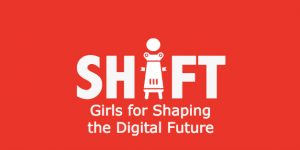 Girls are using technology in almost every aspect of their personal lives. As they develop sociocultural interactions on social media platforms and use software applications on their mobile devices, they are building their digital selves and encountering opportunities to exercise their digital citizenship and to opening paths for their future. Besides socializing, expressing, and learning, teens are also confronting risks that sometimes are not immediately apparent to them. Risks associated with the endurance of digital footprints, cyberbullying, online reputation and the changing contexts of privacy across social media, among others, can be challenging for the construction of the digital self.
Girls are using technology in almost every aspect of their personal lives. As they develop sociocultural interactions on social media platforms and use software applications on their mobile devices, they are building their digital selves and encountering opportunities to exercise their digital citizenship and to opening paths for their future. Besides socializing, expressing, and learning, teens are also confronting risks that sometimes are not immediately apparent to them. Risks associated with the endurance of digital footprints, cyberbullying, online reputation and the changing contexts of privacy across social media, among others, can be challenging for the construction of the digital self.
In order to empower young girls with the knowledge and skills for encouraging positive and responsible uses of networked technologies, help them to develop successful strategies to minimize and manage online risks and to identify digital paths to their future careers, we will co-design two «Digital Citizenship» transmedia playlists. Composed of a series of learning experiences, these playlists are intended to empower girls to develop digital literacy skills and also to foster the cultivation of girls as digital citizens whom, aware of their rights and responsibilities, actively make connections, build communities, learn across contexts and prepare for their future.
The general goal of the two playlists is to foster digital citizenship by helping girls (13-17 yo.) to develop digital literacy skills and understand the challenges and opportunities that digital technologies can bring to their lives.
For this purpose, the facilitators and teen girls from 4 different areas and socio-cultural backgrounds around Chile, will co create and work on two playlists, each of which combines a series of learning experiences and multimedia content related to two main topics: My Digital Self and Careers.
The first playlist, My Digital Self focuses on managing privacy and self online expression and representation; the second playlist, Careers on reflecting about girl’s personal experiences and skills, identifying jobs and professions that match their interests, to finally prepare a resume they can use for a job application. As they learn about potential career paths and resume writing, girls will also have the opportunity to critically think about the importance of social connections, and receiving feedback from mentors.
Following the above, the two «Digital Citizenship» playlists will be co-designed around specific questions that teens have about sharing personal information, credibility, and digital rights, responsibilities and also about building their careers.
The two «Digital Citizenship» playlists will scale and enhance a range of existing connected learning opportunities. First, they will leverage open educational resources in Chile, with a methodology of co-design and connected learning previously developed and tested by the Berkman Klein Center at Harvard University and re-adapted by our AEIF team and participants. Second, by proposing alternative models to the existing curricula in the country through the lens of young girls perspectives and concerns, we will be able to transform the existing material into activities that are tuned to local socio-cultural contexts, to teen passions, more directly speak to their needs, and developed by girls on their own. Third, the open access learning experiences of the playlists will provide bridges between young girls, adults, social media platforms, media, and offline spaces. We intend to not only incorporate the creation and circulation of content on digital platforms as part of the learning experiences, but also to include offline experiences such as debates and activities girls can organize in their local community.
At a local level, our learning resources will serve initially around 60 young girls from 4 different cities of Chile from an ample geographical range, with varied socio-cultural background and focused in vulnerable populations. Some of them are living in extreme areas of the country with little possibilities of accessing initiatives for developing their digital literacy skills and visualize opportunities for developing their careers. The playlists will also serve multiple audiences, including youth, teachers, parents, and school administrators, in both local and regional contexts.
At a regional level, our tools will serve a diverse Spanish-speaking audience that includes members of the multistakeholder network Conectados al Sur, on children, youth and digital citizenship, of which the director of this project is the coordinator http://www.conectadosalsur.org In January 2018, Lionel Brossi will be co-hosting the III Symposium Conectados al Sur, in the city of San José, Costa Rica and one special session of the event will be dedicated to present the methods and design of the project to a wide community of activists, educators, government, policy makers, civil society and private sector, in order to disseminate the project, receive feedback and improve the quality of the pedagogical resources.
More information coming soon. Thank you.
